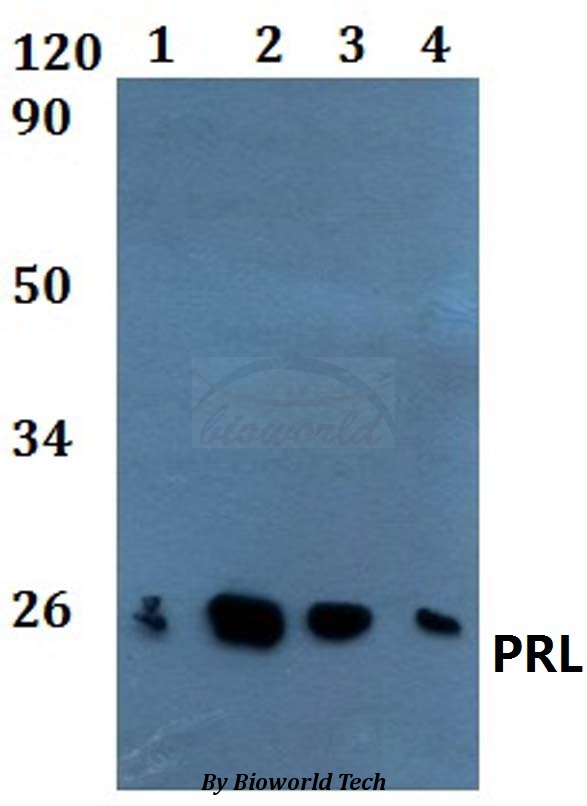Product Name :
PRL polyclonal antibody Background :
Protein tyrosine phosphatases (PTPs) play a role in regulating diverse cellular processes. They form a small class of prenylated protein phosphatases called PRL proteins characterized by a C-terminal consensus sequence for prenylation. PRL-1, also designated Protein tyrosine phosphatase type IVA protein 1 (PTP4A1), is a unique nuclear PTP that is induced in regenerating liver and mitogen-stimulated cells. It is primarily expressed in spleen, bone marrow, thymus, lymph nodes, T lymphocytes and tonsil and is overexpressed in tumor cell lines. PRL-2 (Protein tyrosine phosphatase type IVA protein 2, or PTP4A2) is ubiquitously expressed with highest levels in heart, skeletal muscle and thymus but is also overexpressed in prostate tumor tissue. PPRL-2 is stimulates progression from G1 into S phase during mitosis and promotes tumors. PRL-3, also known as Protein Tyrosine Phosphatase Type IVA, member 3 (PTP4A3) is expressed in heart and skeletal muscle as well as epithelial cells of the small intestine and associates with the cell plasma membrane. Over expression of PRL-3 inhibits angiotensin-II induced cell calcium mobilization and promotes cell growth. PRL-3 is important for colorectal cancer metastasis and may serve as a new therapeutic target for this condition. Product :
Rabbit IgG, 1mg/ml in PBS with 0.02% sodium azide, 50% glycerol, pH7.2 Storage&Stability :
Store at 4°C short term. Aliquot and store at -20°C long term. Avoid freeze-thaw cycles. Specificity :
PRL polyclonal antibody detects endogenous levels of PRL protein. Immunogen :
A synthetic peptide corresponding to residues in Human PRL. Conjugate :
Unconjugated Modification :
Unmodification
PRL polyclonal antibody Background :
Protein tyrosine phosphatases (PTPs) play a role in regulating diverse cellular processes. They form a small class of prenylated protein phosphatases called PRL proteins characterized by a C-terminal consensus sequence for prenylation. PRL-1, also designated Protein tyrosine phosphatase type IVA protein 1 (PTP4A1), is a unique nuclear PTP that is induced in regenerating liver and mitogen-stimulated cells. It is primarily expressed in spleen, bone marrow, thymus, lymph nodes, T lymphocytes and tonsil and is overexpressed in tumor cell lines. PRL-2 (Protein tyrosine phosphatase type IVA protein 2, or PTP4A2) is ubiquitously expressed with highest levels in heart, skeletal muscle and thymus but is also overexpressed in prostate tumor tissue. PPRL-2 is stimulates progression from G1 into S phase during mitosis and promotes tumors. PRL-3, also known as Protein Tyrosine Phosphatase Type IVA, member 3 (PTP4A3) is expressed in heart and skeletal muscle as well as epithelial cells of the small intestine and associates with the cell plasma membrane. Over expression of PRL-3 inhibits angiotensin-II induced cell calcium mobilization and promotes cell growth. PRL-3 is important for colorectal cancer metastasis and may serve as a new therapeutic target for this condition. Product :
Rabbit IgG, 1mg/ml in PBS with 0.02% sodium azide, 50% glycerol, pH7.2 Storage&Stability :
Store at 4°C short term. Aliquot and store at -20°C long term. Avoid freeze-thaw cycles. Specificity :
PRL polyclonal antibody detects endogenous levels of PRL protein. Immunogen :
A synthetic peptide corresponding to residues in Human PRL. Conjugate :
Unconjugated Modification :
Unmodification
-
 Western blot (WB) analysis of PRL polyclonal antibody at 1:500 dilution Lane1:A549 whole cell lysate Lane2:MCF-7 whole cell lysate Lane3:H9C2 whole cell lysate Lane4:SP20 whole cell lysate
Western blot (WB) analysis of PRL polyclonal antibody at 1:500 dilution Lane1:A549 whole cell lysate Lane2:MCF-7 whole cell lysate Lane3:H9C2 whole cell lysate Lane4:SP20 whole cell lysate
Bioworld Biotech only provide peptides for our antibodies and do not provide additional peptide customization services.
Price/Size :
USD 368/1mg/vial
Tips:
For phospho antibody, we provide phospho peptide(0.5mg) and non-phospho peptide(0.5mg).Describe :
Blocking peptides are peptides that bind specifically to the target antibody and block antibody binding. These peptide usually contains the epitope recognized by the antibody. Antibodies bound to the blocking peptide no longer bind to the epitope on the target protein. This mechanism is useful when non-specific binding is an issue, for example, in Western blotting (WB) and Immunohistochemistry (IHC). By comparing the staining from the blocked antibody versus the antibody alone, one can see which staining is specific; Specific binding will be absent from the western blot or IHC performed with the neutralized antibody.Formula:
Synthetic peptide was lyophilized with 100% acetonitrile and is supplied as a powder. Reconstitute with 0.1 ml DI water for a final concentration of 10 mg/ml.The purity is >90%,tested by HPLC and MS.
Storage:
The freeze-dried powder is more stable. For short time at 2-8°C. For long term storage store at -20°C.
Note :
This product is for research use only (RUO only). Not for use in diagnostic or therapeutic procedures.
 PRL polyclonal antibody
PRL polyclonal antibody  Datasheet
Datasheet COA
COA MSDS
MSDS SHIP
SHIP